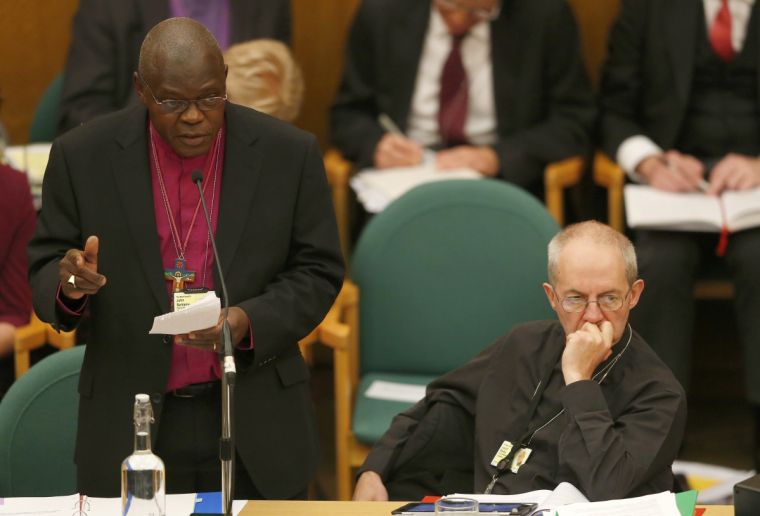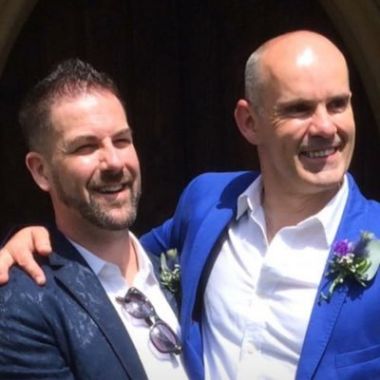Battle looms in Church of England over 'blessings' for gay marriage

Evangelicals are preparing to block what they believe is an attempt to introduce same-sex blessings to the Church of England.
Nearly 500 members of the the General Synod, the Church's parliament, will meet in York this weekend. They will spend three days behind closed doors in the final round of "shared conversations" discussing the Church's response to same-sex relationships.
Conservatives believe that after the York meeeting, the Church's bishops will discuss the issue and then draw up a plan for some form of "pastoral accommodation". This plan will go back to synod when it meets in London in February, a source told Christian Today.
And it could take the form of an authorised service of "welcome" or even blessing for people in same-sex relationships.
Bishops and regional groups from the dioceses have over the last two years been holding shared conversations where church leaders and church members from across the spectrum have been sharing their points of view and their experiences.
The shared conversations are overseen by Canon David Porter, who heads the Archbishop of Canterbury's reconciliation ministry and was involved behind the scenes in helping bring about Northern Ireland's Good Friday Agreement.

Father Andrew Foreshew-Cain, who represents London diocese on General Synod and is married to his partner Stephen Foreshew, told Christian Today: "There has to be some accommodation towards the progressive affirming wing of the Church."
There is unlikely to be any attempt to change the definition of marriage.
However, progressives are hoping for a move towards allowing church services of recognition for civil partnerships and same-sex marriages.
Calling such services "blessings" would be problematic but they could be given another name such as "services of welcome".
Any new liturgy authorised by the Church will require a two-thirds majority in the General Synod.
Currently, conservative evangelicals and other opponents of gay marriage hold more than one third of seats in the House of Laity so even a limited attempt to offer a liturgical welcome to gay couples currently stands little chance of getting through if it has even the slightest indication that the union is recognised.
Foreshew-Cain estimates that hundreds, possibly thousands of Church of England parish churches currently use unauthorised liturgies such as those published by Changing Attitude website to bless gay partnerships. He said: "There has to be change. The conservatives are not going to be able to stop it."
He said he was attacked at synod. "I have been told to my face that I am a false preacher. I asked this person whether they thought I was a Christian. They refused to answer the question. We have got to get beyond this. The bishops have got to show some real leadership. They have to recognise the Church must move. The Church must recognise what has happened in society, and the shift that has happened in the Church itself. We cannot continue to be held hostage by a small minority of older conservatives."
A source told Christian Today that conservatives will not hesitate to block any move towards even limited recognition by the Church of same-sex partnerships.
A leading conservative evangelical defended the orthodox stance.
He said: "There is already common practice among evangelicals of praying for and caring pastorally for all sorts of people without suggesting that they are converted or endorsing their lifestyle. It may be praying for a follower of another faith on the street who is distressed, praying with an unmarried couple who have no intention of marrying or of following Christ but who want their child baptised, or praying with a gay couple who are asking the church to publicly affirm and celebrate their relationship but who have been gently and respectfully reminded of the Church's official teaching and the Scriptural vision for human flourishing which underlies it."
He said the many who advocate pastoral care of those with same sex attraction or self-identifying LGBT people according to traditional orthodox models and who cannot bless or affirm same sex relationships, are not doing so because of homophobia, fear of being excluded from their own group, lack of listening or engagement with testimonies and theological arguments. "It is because of their understanding of the Scriptures, the character of God and the nature of humanity, and their desire to stand with the worldwide church in making disciples and opposing potentially harmful cultural trends."
The Church of England currently allows informal prayers to support same-sex relationships.
Its own weddings website says: "The law prevents ministers of the Church of England from carrying out same-sex marriages. And although there are no authorised services for blessing a same-sex civil marriage, your local church can still support you with prayer.
"Church of England ministers can not carry out or bless same-sex marriages, but your local church is still there for you. At any time you are welcome to come and pray with us, or ask us to pray for you. You might just need space for yourself to pray – some churches or cathedrals are left open at certain times so anyone can go in."
According to the Norwich diocese, there is "no realistic expectation of achieving consensus" on these matters in the foreseeable future, and so the Archbishop of Canterbury has stressed the importance of working at reaching "good disagreement".
The concept of "pastoral accommodation" came up in the Pilling Report, published in 2013 by a working group on human sexuality chaired by Sir Joseph Pilling. It was this report that recommended the listening process that became the shared conversations.
A 2013 Church report, Men and Women in Marriage, also acknowledged the importance of finding forms of "pastoral accommodation" to address the pastoral needs of those in "hard circumstances or exceptional conditions".
The ethics scholar Oliver O'Donovan, a former professor at New College Edinburgh and at Oxford, told Pilling: "A pastoral accommodation is a response to some urgent presenting needs, without ultimate dogmatic implications."
He suggested a pastoral accommodaton could be "to find a way of acting, then, that is charitable, modest, provisional, ideologically light, keeping the Church's mind flexible and open, a way of acting that has more of the experiment than the conclusion about it, does not base itself on sweeping assertions of fact or principle that turn out to be false coinage which nobody can honour."
Another document published to accompany the shared conversations, Grace and Disagreement, says: "A pastoral accommodation is a way of making that pastoral offering without endorsing the circumstances through which the situation arose or giving moral approval to every element in a messy state of affairs."
Evangelical opponents of gay marriage believe however that it is impossible to separate any form of authorised pastoral accommodation from doctrine. Anything that will keep the conservatives happy, will go nowhere near far enough for the liberals.
One leading evangelical, with an open mind on this issue, said: "I'm worried that there is a terrific battle ahead. If they try and force it through, it will be a bloodbath."











